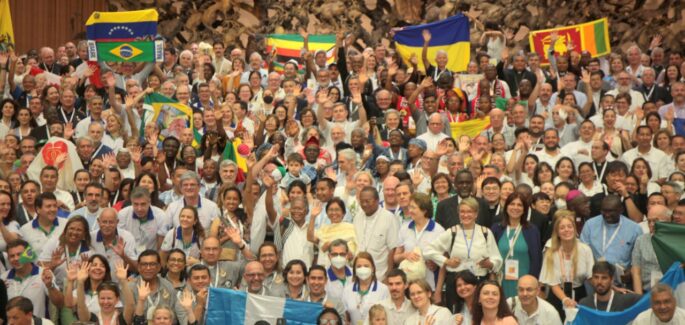
A few years ago, my son invited me to dinner at a restaurant; he had studied economics and was now financially independent. When paying the bill, he said with a smile: “Dad, this is the ‘return on your investment’!” – As a father of five children, I can confirm: Having children is a big “investment” – not just financially! At the same time, I can testify that this “investment” pays; I have been repaid a hundredfold. Not primarily financially, but in many other ways. My children have been and are my best teachers and I have learned a lot from them. Our son has recently become a father in his turn and is experiencing not only the miracle of neonatal life, but also the challenges that come with a child: short nights, the transition from a partnership to being a family. Suddenly he was filled with gratitude to his parents: “You too have done all this for me, for us, your children!”. I reminded my son of the return on his investment’: “You’ll be repaid a hundredfold!”.
Discover the best in each other.
A motto has accompanied me and my wife for 47 years: “Fidelity means always meeting up knowing that we have not yet discovered the best of each other“. I found a similar phrase in this apostolic exhortation of Pope Francis: “Fantasies about an idyllic and perfect love do us no good, they deprive us of any stimulus to grow. A heavenly idea of earthly love forgets that the best is what has not yet been achieved, like wine matured over time.” (135)
Or to put it another way: “You don’t live together to be less and less happy, but to learn to be happy in a new way, starting from the possibilities opened by a new stage in life. (232)
What strikes me about this letter from Pope Francis is his sensitivity as to what concerns people nowadays to do with marriage and family. As a pastor, I know many young couples are concerned how to reconcile both in a partnership: freedom and bonding, personal development and renunciation in favor of the partner. “Amoris laetitia” also resumes this dilemma: “Loneliness is feared, a space of protection and fidelity is desired, but at the same time there is a growing fear of being captured by a relationship that may postpone the satisfaction of personal aspirations.” (34)
Marriage and family as a vocation
It seems important to me to understand marriage as a vocation. This is mentioned rather in passing in the papal document: “The Preparation Course must ensure that the couple preparing for marriage do not see this as the end of a journey, but they assume marriage as a vocation that thrusts them forward, with a firm and realistic commitment to go through all the trials and difficult moments of life together.” (211)
Today marriage can no longer be taken for granted, it is no longer the logical step in the biography of most young people. Many have respect for marriage and know marriage requires a conscious decision. Those who understand marriage as a vocation – that is, as a call of God to this way of life – receive an additional motivation: they know that they are brought to this by God, by his love; and with a vocation there is always also a task! Not only the task of loving each other, but also the call to be present for others as a married couple. “Amoris laetitia” encourages this step, emphasizes the positive and even practices self-criticism: it is neither a question of complaining about “the current evils”, nor of wanting to “impose norms by the force of authority”. “It requires a wholehearted effort to present the reasons and motivations to opt for marriage and the family, so that people are more willing to respond to the grace that God offers them.” (35)
However, I would also talk about a dual vocation: The vocation to marriage and the vocation to the family, that is, to children. Because even married couples without children (for whatever reason) have a vocation. The papal document also self-critically admits the too long advocated restriction of marriage to procreation: “On the other hand, we have often presented marriage in such a way that its unitive purpose, the invitation to grow in love, and the ideal of mutual help have remained in the shade for an almost exclusive emphasis placed on the duty of procreation.” (36)
This is underlined again later in the document: “Therefore, in no way can we present the erotic dimension of love as a permitted evil or as a burden to bear for the good of the family, but as a gift from God that embellishes the encounter between the spouses.” (152)
In short, faithful to the title of the apostolic exhortation “Amoris Laetitia”:”In marriage it is good to take care of the joy of love.” (126)
Woman and man, mother and father
In general, the papal document strikes me for its positive and encouraging language – despite the perception of many questionable problems and developments. I find particularly important the reference at the beginning that even when respecting “the unity of doctrine” it is possible to have “different ways of interpreting certain aspects of doctrine or some consequences that derive from this” and despite the universality of the Church (Catholic) “you can search for more inculturated solutions in each country or region, being attentive to local traditions and challenges”. (3)
Pope Francis also recognizes the role of women in today’s society and sees the positive in feminism: “The feeling of being orphans that many children and young people experience today is deeper than we think. Today we recognize that it is perfectly legitimate, and also desirable, for women to want to study, work, develop their skills and have personal goals. But at the same time, we cannot ignore the need for children for a maternal presence, especially in the first months of life. … The decrease in a maternal presence with its feminine qualities poses a serious risk for our world . I appreciate feminism when it doesn’t demand uniformity or denial of motherhood.” (173)
It is true that the father is also encouraged to take his part in the house and in the family – but in my opinion with too little emphasis:“Taking on homework or some aspects of child growth doesn’t make a man any less masculine.” (286)
Encouraging, on the other hand, is this advice on the education of children, which I can only emphasize from my personal experience:“However, being obsessed is not educational, and you cannot have control of all the situations in which a child might find themselves going through. Here the principle applies that ‘time is greater than space’. That is to say, it is about generating processes more than dominating spaces.” (261)
But again, let’s go back to the position of women. Here Francis is very clear: “In this brief look at this reality, I would like to point out that, while there have been significant improvements in the recognition of women’s rights and their participation in public space, there is still much to improve in some countries. Unacceptable customs have not yet been completely eradicated. … There are those who believe that many of the current problems have occurred since the emancipation of women. But this argument is invalid, it is a falsehood, it’s not true.” (54)
Encouragement through Christ
In ‘Amoris laetitia’ there is no lack of biblical background, among other things with a detailed interpretation of the song of love from the first letter to the Corinthians 13. I find the reference to Jesus, “the living Christ” (59), to the “gaze of Jesus… who looked at the women and men he met with love and tenderness.” (60) And finally, a precious reference to Jesus’ words of encouragement: “He who loves is able to say words of encouragement, which comfort, that give strength, that console, that stimulate. Let’s see, for example, some words that Jesus said to people: ‘Take heart, son!’ (Mt 9:2). ‘Great is your faith!’ (Mt 15:28). ‘Get up!’ (M.Y. 5:41). ‘Go in peace’ (Lk 7:50). ‘Do not be afraid’ (Mt 14:27). These are not words that humiliate, sadden, irritate, despise. You have to learn to use this loving language of Jesus in the family.” (100)
However, the image of the family in the Bible is quite sober. Where’s the model family? Apart from the family of Jesus, of whom we actually know little according to the gospels, we encounter very imperfect family stories in the Bible. If we look closely, the word “family” does not appear at all. Where our Bible speaks of “family”, Jewish and Greek texts usually use the word “home”. This is a reference to the extended family. “Amoris laetitia” also indicates this: “The small family unit should not isolate itself from the extended family, where there are parents, uncles, cousins and even neighbors.” (187) “This extended family should welcome with great love single mothers, children without parents, women who alone must carry on the education of their children.” (197)
Jesus himself broadens his vision to the greatest family: “Whoever does the will of my Father who is in heaven, he is for me brother, sister and mother” (Mt 12:50). John’s Gospel speaks to us of this “new family”: on the last evening before his death, Jesus is with his closest friends, which he formed in a community, a family, during a period of about three years. With infinite patience he tried to teach them the new way of life of the gospel, where the smallest is the greatest and the last is the first. The washing of feet is his last service to them. The motto of this story is: “Having loved those who were His own in the world, he loved them to the end” (Jn 13:1). In this service as a slave that Jesus does there is a revolution, a reversal of values. Jesus says it clearly: “So if I, the Lord and the Master, have washed your feet, you too must wash your feet to each other.” Wash each other’s feet – this is Jesus’ motto for the family too. And nowhere is this more concrete than in the family, where washing and ironing, cleaning and preparing, changing diapers and wiping tears are part of everyday life. There, like Jesus, man and woman must wear an apron, take a broom in their hand, polish shoes, get their hands dirty and bend their backs again and again. Love is not just about the marriage festivity, where water turns into wine. Love is also about service.
And it’s mutual! We should wash each other’s feet.
Vocation to marriage – vocation to celibacy
I also find it important in the apostolic exhortation that the vocation to marriage should not be opposed to the vocation to celibacy:“Therefore, it is not a question of diminishing the value of marriage for the benefit of continence.” (160) “While virginity is an ‘escatological’ sign of the risen Christ, marriage is a ‘historic’ sign for those walking on earth, a sign of an earthly Christ who agreed to join us and gave himself up to donate his blood.” (161)
I was also surprised at the admission that a celibate priest, without the experience of marriage and family, has a handicap: “In the responses to consultations sent to the whole world, it was found that the ministers ordained often lack adequate training to deal with the complex current problems of families. The experience of the long Eastern tradition of married priests can also be useful in this regard.” (202)
The greater inclusion of women in the formation of priests is also far-sighted: “The presence of laity and families, in particular the presence of women, in priestly formation, fosters appreciation for the variety and complementarity of the different vocations in the Church.” (203)
Inter-denominational marriages
On the subject of interfaith and interreligious marriages, the positive assessment initially predominates:“Marriages between Catholics and other baptized people present, even in their particular physiognomy, numerous elements that it is good to enhance and develop, both for their intrinsic value and for the contribution they can make to the ecumenical movement”. (247)
However, this encouragement is immediately followed by a bitter tip:
“Although the spouses of a mixed marriage have in common the sacraments of baptism and marriage, the sharing of the Eucharist can only be exceptional…” (247)
Are inter-denominational marriages not above all ecclesial and ecumenical cells?
Catholic theologist Eva-Maria Faber writes: “This is more than the emergency situations of individual believers. Here are people who live as a small church. They are people who in their common journey represent God’s covenant with humanity. They cannot be expected to accept this vocation and at the same time be denied the opportunity to be strengthened in their unity by sharing the Eucharist, the celebration of the New Covenant”.[1]
I would like to conclude my comment to “Amoris laetitia” with a quote that I can emphasize in all points of my personal experience and that speaks precisely of the challenge and joy of love in marriage and in the family: “[…] It is a good thing to always give a kiss in the morning, bless each other every night, be in wait for each other and be welcoming, go out together sometimes, share household chores. But at the same time, it is good to break with routine and have fun, don`t lose the ability to celebrate as a family, to rejoice and celebrate beautiful experiences. Share your surprise for God’s gifts and feed mutual enthusiasm for life. When you know how to celebrate, this ability renews the energy of love, frees it from monotony and fills daily habits with color and hope. » (226)
Peter Dettwiler
[1] Peter Dettwiler, Eva-Maria Faber. Eucharist and Communion. Ecumenical Perspectives. Lembeck/Bonifatius, 2008. p. 72f




